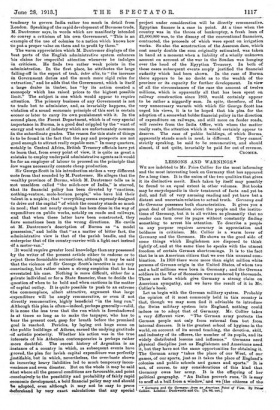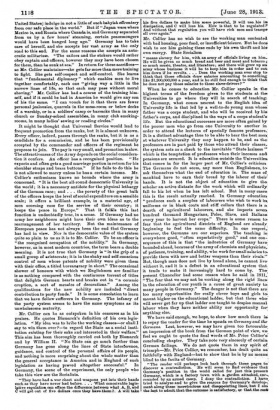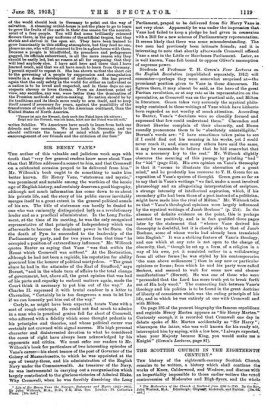LESSONS AND WARNINGS.*
WE are indebted to Mr. Price Collier for the most informing and the most interesting book on Germany that has appeared for a long time. It is the union of the two qualities that gives it its distinctive merit. Each taken by itself may possibly be found to an equal extent in other volumes. But books may be encyclopaedic in their treatment of facts and yet be dull, and full of very amusing reading and yet have bnt distant and uncertain relation to actual truth. Germany and the Germans possesses both characteristics. It gives you a great deal of information about the people and the institu- tions of Germany, but it is all written so pleasantly that no reader can turn over its pages without constantly finding something to arrest his attention. To describe a people to any purpose requires accuracy in appreciation and boldness in criticism. Mr. Collier is a warm lover of Germany and the Germans. He shows us the good side of sonic things which Englishmen are disposed to think lightly of, and at the same time lie speaks with the utmost freedom of certain German shortcomings. It is to the fact that he is an American citizen that we owe this unusual com- bination. In 1910 there were more than eight million white persons of German origin in the United States, of whom two and a half millions were born in Germany ; and the German soldiers in the War of Secession were numbered by thousands. These are facts which give Germany a strong claim on American sympathy, and we have the result of it in Mr. Collier's book.
Let us begin with the German military system. Probably the opinion of it most commonly held in this country is that, though we may soon find it advisable to introduce the Swiss military system into England, nothing could. induce us to adopt that of Germany. Mr. Collier takes a very different view. "The German army protects the German people not only from external foes but from internal diseases. It is the greatest school of hygiene in the world, on account of its sound teaching, the devotion, skill, and industry of its officers, the number of its pupils, and its widely distributed lessons and influence." Germans need physical discipline just as Englishmen and Americans need. it, but they have not the same opportunities for obtaining it. The German army "takes the place of our West, of our games, of our sports, just as it takes the place of England's colonies and public schools and games and sports." It is not, of course, to any considerations of this kind that Germany owes her army. It is the offspring of her political geography. "An Italian proverb runs, 'It is easy to scoff at a bull from a window,' and we [the citizens of the • Germany and the Germans: from an American Point of View. By Priors
Collier. London : Duckworth and Co. [7a. 6d, not.] _
United States] indulge in not a little of such babyish effrontery' from our safe place in the world." But if "Japan were where Mexico is, and Russia where Canada is, and Germany separated from us by a few hours' steaming, certain peacemongers would have been hanged long ago." Germany has to take care of herself, and she accepts her vast army as the only road to this end. For the same reasons she accepts an auto- cratic militarism. "The sailors and the stokers would rather
obey captain and officers, however they may have been chosen for them, than be sunk at sea." In return for these sacrifices—
so Mr. Collier maintains—she gets far more than mere training to fight. She gets self-respect and self-control. She learns that " fundamental diplomacy " which enables men to live together comfortably, each one "giving way a little in the narrow lines of life, so that each may pass without moral shoving." Mr. Collier has had a course of the training him- self, and if it could be had in America he would give any son of his the same. "I can vouch for it that there are fewer personal jealousies, quarrels in the mess-room or below decks of a warship, or in a soldiers' camp or barracks than in many church or Sunday-school assemblies, in many club smoking- rooms, in many ladies' sewing or reading circles."
It might be thought that Universal Service would lead to frequent promotion from the ranks, but it is almost unknown. Every officer, indeed, passes through the ranks, but it is as a candidate for a commission, and he has been provisionally accepted by the commander and officers of the regiment he proposes to join. The pay is very small, and promotion is slow. The attractiveness of the Army depends on the social considera- tion it confers. An officer has a recognized position. " He expects and often gets a good marriage portion in return for his shoulder straps and brass buttons." if he fails to do this he is not allowed to marry unless he has a certain income. Mr. Collier's enthusiasm knows no bounds where the army is concerned. "It is the best all-round democratic University in the world; it is a necessary antidote for the physical lethargy of the German race ; and . . . the poverty of the great bulk of the officers keeps the level of social expenditure on a sensible scale; it offers a brilliant example, in a material age, of men scorning ease for the service of their country ; it keeps the peace in Europe." That it fulfils this last function is undoubtedly true, in a sense. if Germany had no army her neighbours might have their own ideas as to the rearrangement of her territory. But the maintenance of European peace has not always been the end that Germany has had in view. Ncr is the democratic value of the system quite so plain to us as it is to Mr. Collier. To be an officer is "the recognized occupation of the nobility." In Germany, however, as in most modern countries, the term bears a double meaning. It is not true that Germany is " in the grip of a small group of aristocrats; it is in the shaky and self-conscious control of men whose patents of nobility were given them with their office, a titled bureaucracy in short." The occasional shower of honours with which we Englishmen are familiar is as nothing compared with the continuous torrent of titles that delights German hearts and breaks out in "a ceramic eruption, a sort of measles of decorations." Among the qualifications for the new nobility are included "direct contribution to party funds." It is some consolation to learn that we have fellow sufferers in Germany. The infancy of the party system seems to have the same symptoms as its unwholesome maturity.
Mr. Collier can be as outspoken in his censures as in his praises. He quotes Bismarck's definition of his own legis- lation. " My idea was to bribe the working classes—or shall I say to win them over ?—to regard the State as a social insti- tution existing for their sake and interested in their welfare."
This aim has been thoroughly carried out both by Bismarck and by William II. "No State can go much further than Germany has gone along the lines of State interference, guidance, and control of the personal affairs of its people, and nothing is more surprising about the whole matter than the general acceptance in America and in England of such legislation as having preyed altogether successful." In Germany, the scene of the experiment, the only people who take this view are the Socialists.
"They have had a war chest and weapons put into their bands such as they have never had before. . . . What conceivable legis- lative regulatioa can efface the difference between what A, B, and C will get out of five dollars once they have them?. A will take
his five dollars to make him mere powerful, B will use his in dissipation, and C will lose his. How is that to be regulated ? And without that regulation you will have rich men and tramps' all over again."
Mr. Collier has no wish to see the working man oontented with bad housing, poor food, or insufficient-leisure. But be doers wish to see him gaining these ends by his own thrift and hie
own energy. State Socialism
" means slavery for him, with an army of officials living on him. He will be given so much bread and beer and meat and tobacco ; so much music, theatre, and literature; and there will grow up an army whose business it will be to keep him in order and to cub him down if he revolts. . . . Does the working man ever stop to' think that those officials draw salaries amounting to something like $1,200,000,000 a year, and is he still fowl enough to think that he does not pay those salaries to those slave-drivers ?"
When he comes to education Mr. Collier speaks in the highest terms of the freedom given to the students at the Universities to go where they will in search of teaching. In Germany, what comes nearest to the English idea of
University life is that led by a well-to-do young man whose: father was a corps student, and who will be received by his father's corps, and dise!plined in the ways of a corps student's life. But the educational successes are more often gained by the poorer men who go from one University to another in order to attend the lectures of specially famous professors,' It is a distinct advantage thus to be able to hear the best men; at whatever University they may happen to be, and as the professors are in part paid by those who attend their classes,.
the system acts as a check to the inevitable " State laziness which is the temptation of professors when their incomes and pensions are secured. It is education outside the Universities that comes in for the larger part of Mr. Collier's criticism The Germans do not seem, any more than Englishmen, to ask themselves what the end of education is. The mass of mankind have to earn their bread by the labour of their hands. It is not the object of education to give the scholar an active distaste for the work which will ordinarily' fall to his lot when he has left school. But in many cases this is the result actually reached. ln Germany education " produces such a surplus of labourers who wish to work in uniforms or in black coats and stiff collars that there is a
dearth of agricultural labourers, and she imports seven hundred thousand Hungarians, Poles, Slays, and Italians.
every year to harvest her crops." There is some reason to. fear that the agricultural districts of England are already beginning to feel the same difficulty. In one respect; however, the Germans are our superiors. The teaching is everywhere good, " often superlatively good," and one con- sequence of this is that "the industries of Germany have- bounded ahead, because of the army of chemists and physicists,: of patience, training, and ability, who work for small salaries to. provide them with new and better weapons than their rivals.' But, though man does not live by bread alone, he cannot live- without it, and it is a defect in an educational system that.. it tends to make it increasingly hard to come by. The present Chancellor had some reason when he said in 1911; "The fear that we may not be working along the right linen in the education of our youth is a cause of great anxiety to many people in Germany." The danger is not that there are too many opportunities for really clever boys and girls to mount higher on the educational ladder, but that those who; will never get far up that ladder are taught to despise manual labour when they have neither ability nor opportunity for anything else.
We have said enough, we hope, to show how much there ie
to repay the reader for the time he spends on Germany and the-
Germans. Lest, however, we may have given too favourable an impression of the book from the German point of view, we.
feel we ought to quote the final words of Mr. Price Collier's: concluding chapter. They take note very sincerely of certain German failings. We do not quote them in any spirit of triumph—Mr. Price Collier, we remember, has dealt quite as faithfully with England—but to show that he is by no means blind to the faults of Germany.
" The reader will perhaps look back through these pages to discover a contradiction. He will seem to find' evidence that" Germany's position in the world called for just this present Germany, which is a factory town with a .garden attaohed, sur-, rounded by an armed camp. I dory the contradiction. I have, tried to analyze and to give the reasons for Germany's develop--; ment along these meretricious and disappointing lines, but •1 am the last to admitaliat.tha outcome is satisfactory, qr that.the re,s111 of. the world should look to Germany to point out the . way of salvation. A. steaming orchid-house is not the place to go to learn to grow the fruits of the earth in their due season for the nourish- ment of a. free people. You will find some brilliantly coloured dowers there, in the gay uniforms of theartificial tropics, but they :shrink and shrivel in the open air. They have been trained to grow luxuriantly in this stifling atmosphere, but they feed no one, please no one, who will not consent to live in a glass house with them. Because a people is blindfolded, its preachers and pedagogues gagged, its officials subservient, is all the more reason why they should be easily led, but no reason at all for supposing that they will lead anybody else. I have said here and there that I have learned muck'and that we all have much to learn from Germany. I pernat Myself to. repeat it. She has shown us that the short cat to the governing bf a people by suppression and strangulation -results in a dreary development of mediocrity. She has proved .again that the only safetar_in the-world for either an individual or .a nation is to be loved and respected, and in these days no one respects slaveey or loves threats. From an American point of -view, any sacrifice, any war, were better than the domination of the Prussian methods of nation-making. No nation should be by its traditions and its ideals more ready to arm itself, and to keep itself armed if necessary for years, against the possibility of the transference of such methods to the American continent, than the United States of North America.
Theuer 1st mir der Freund, doch such den Feind kann ich Matzen ; Zeigt mir der Freund, was ich kann, lehrt mix der Feind was ich soli; 'writes Schiller. We Americans have much to learn from both our filiends and our enemies. We have both in Germany, and we should cultivate the temper of mind which profits by the 'encouragement of our friends and the criticism of our foes."




























































 Previous page
Previous page